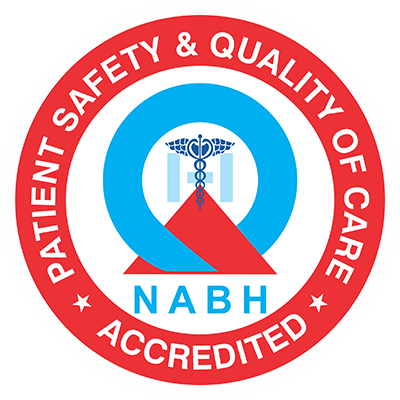
For 38-year-old Radhika the past two years had been a battle with uterine fibroids, leading to heavy bleeding, unbearable pain, and severe fatigue. Doctors recommended a hysterectomy i.e. removal of the uterus. But as a young woman who still hoped to conceive, she was desperate for an alternative.
That’s when she discovered Uterine Fibroid Embolization (UFE), an interventional radiology procedure that shrinks fibroids by cutting off their blood supply. Guided by imaging, the doctor inserted a tiny catheter through a small incision in her groin, delivering treatment directly to the fibroids.
Within months, her fibroids shrank significantly, her symptoms disappeared, and most importantly, she retained her uterus. No surgery, no long hospital stay…just relief and restored hope!
Advancements in medical science have redefined how diseases are treated, offering patients safer, quicker, and more effective solutions. Among these breakthroughs, Interventional Radiology (IR) stands out as a game-changer, enabling doctors to treat complex conditions with minimally invasive procedures guided by medical imaging.
For patients who fear surgery, long hospital stays, or painful recoveries, interventional radiology offers an alternative that is safe, effective, and requires minimal downtime. Whether treating blocked arteries, tumours, or chronic pain conditions, IR is transforming healthcare, making it less invasive and more patient-friendly.
What is Interventional Radiology?
Interventional Radiology is a specialised branch of medicine that uses imaging techniques like X-rays, ultrasound, CT scans and MRI, to guide tiny instruments inside the body for precise treatment. Instead of large surgical incisions, IR procedures use small punctures (sometimes no bigger than a pinhole) to access blood vessels and internal organs.
This approach significantly reduces pain, scarring, and recovery time compared to traditional surgery. Many procedures allow patients to return home the same day, making IR a preferred choice for those seeking effective, low-risk treatments.
How does Interventional Radiology work?
Interventional radiologists are highly trained specialists who use real-time imaging to navigate tiny instruments, such as Catheters, Guidewires, Needles and Stents. By using these tools, doctors can precisely target diseased tissues, repair damaged arteries, or even destroy tumours without traditional surgery.
Common Conditions Treated with Interventional Radiology
Interventional radiology is used to treat a wide range of vascular, neurological, and cancer-related conditions. Some of the most common ones are:
Vascular & Heart Conditions:
- Angioplasty & Stenting
- Embolisation
- Deep Vein Thrombosis (DVT) Treatment
Cancer & Tumour Treatments
- Tumour Ablation
- Chemoembolisation
- Radioembolisation
Women’s Health Conditions
- Uterine Fibroid Embolisation (UFE)
- Ovarian Cyst Drainage
Neurological & Stroke Care
- Mechanical Thrombectomy
- Carotid Artery Stenting
Pain Management & Orthopedic Treatments
- Vertebroplasty & Kyphoplasty
- Nerve Blocks & Ablation
Advantages of Interventional Radiology Over Traditional Surgery
- Minimally Invasive – No large incisions, reducing pain and risk of infection
- Faster Recovery – Many procedures allow same-day discharge
- Less Scarring – Tiny punctures instead of large surgical cuts
- Reduced Hospital Stay – Many procedures are outpatient or require just a short stay
- High Precision – Imaging-guided procedures ensure accurate treatment
The Growing Role of Interventional Radiology in Modern Medicine
With rapid advancements in imaging technology and medical techniques, interventional radiology is expanding its role in multiple specialties, from oncology to cardiology.
- Cancer Care – Used for highly targeted tumour destruction, reducing reliance on chemotherapy and radiation
- Emergency Medicine – Stroke and trauma patients now receive life-saving treatments in record time, improving survival rates
- Preventive Care – Routine IR screenings help detect and treat conditions before they become severe
Interventional Radiology requires high-precision equipment, an expert team and real-time experience. So choosing the right healthcare partner plays a crucial role in recovery.
BBR Hospitals Hyderabad offers the latest in Interventional Radiology treatments. Equipped with state-of-the-art imaging technology that uses advanced MRI, CT, and ultrasound, its team of expert radiologists specializes in complex interventional radiology (IR) procedures, even as it ensures precision, accuracy, and safety in every procedure. BBR Hospitals has delivered maximum results across a wide range of conditions, from vascular treatments to cancer care, offering effective, non-surgical solutions that reduce risks and recovery time. The hospital follows a patient-centered approach, prioritizing comfort, fast recovery, and long-term health benefits. Additionally, BBR Hospitals is dedicated to providing high-quality, world-class care at affordable prices, ensuring that advanced medical treatments remain accessible to all.
Whether you are dealing with vascular diseases, tumours, fibroids, or chronic pain, ask your doctor about Interventional Radiology treatment options for a safer, faster, and more effective path to healing.


